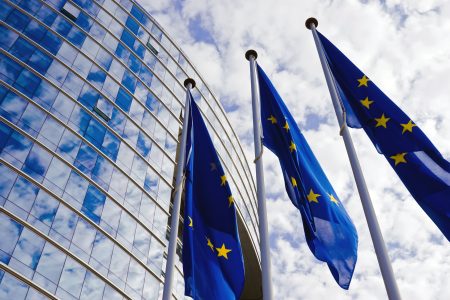As the old saying goes, there is nothing permanent but change. With a new European Commission about to take office, the tone of conversations in the EU bubble is very different from the ones taking place five years ago. The word is that European economic growth, resilience and competitiveness will now take precedence over the Green Deal’s priorities. The publication of the Draghi report is no stranger to these conversations as it reopened the debate on the seemingly mutually exclusive objectives of sustainability and economic considerations.
Kathy Roussel is the Head of Advocacy and Engagement at amfori.
This is unfortunate to say the least, as over the past five years so much effort had been put in articulating the business case for mandatory due diligence which would benefit people and planet whilst strengthening business resilience.
At amfori we believe in trade with purpose and as such we are convinced that there cannot be sustainable profit without responsible business. Whilst there is no doubt that EU competitiveness is essential for our future, it should not be limited to the aim of bridging the technology gap with our main trading partners.
Competitiveness also means increasing resiliency, securing access to key resources and supply chains, being able to anticipate business risks and opportunities and acting upon them – sustainability is key to achieve all of those.
Would not it be wise to also consider that the efforts made to position the EU as a front-runner on sustainability topics can be one of our unique selling points?
The EU needs to keep raising the flag of Sustainable Trade in Global Supply Chains
Everywhere in the world, be it in the US or Asia, the business community is closely monitoring EU political decisions in that regard and already understands what a turning point the green deal agenda has been. So, whilst the words “Sustainable Trade” seem to have recently disappeared from the EU political agenda, it is critical that Europe continues using its leverage as one of the biggest trading partners in the world. Our future trade negotiations should become a race to the top rather than a race to the bottom.
A key principle at the core of responsible business conduct is to encourage companies to take responsibility beyond their own operations. This is where the biggest impacts tend to materialise. Such responsibility, however, is proportionate to the causal link of the company to the impact as indicated in long-established international standards for due diligence.
Because the EU legislation now requires companies to take action across their international supply chains, market mechanisms that promote the uptake of responsible practices and enable policy frameworks in non-EU sourcing countries have become critical to supporting the implementation of EU sustainability policies.
In the Midst of the Legislative Storm, Keep Calm and Report with Impact
There is no doubt that the pace of sustainability developments regulating business practices has accelerated tremendously over the past years. To the point where the business community may feel a bit dizzy in the midst of a legislative hurricane. However, any hurricane has an eye, a calm place in the middle of a storm.
In Europe, this quiet space, the eye of the hurricane, is to be found at the intersection between the Corporate Sustainability Reporting Directive (CSRD) and Corporate Sustainability Due Diligence Directive (CSDDD).
Both legislations are anchored in the same principles of transparency, accountability and continuous improvement. In essence, companies are asked to understand their impacts in global value chains, take action to address them and report on it. This may feel challenging, understandably. It is important to keep in mind, however, that companies are not required to do everything at once, but to start wherever feasible and prioritise the most salient risks. Also, the actions to take will vary depending on how a company connects to impacts.
Someone once said that “due diligence is not a science but an art”. That’s precisely the spirit behind those laws. It is not about the pursuit of perfection; rather about improving step by step and then communicating about own efforts. Our message to businesses: focus on what’s common about those laws. This way companies can make their compliance exercise more efficient and set a basis to benefit from fairer market rules, anticipate increasing sustainability expectations and improve their resilience in the mid and long run.
There will be no progress achieved by reporting for the sake of reporting. Instead of focusing all resources on just collecting ESG data, let’s keep in mind that sustainability reporting goes hand in hand with sustainability due diligence – it is ultimately about what the company ‘does’ to address its impacts. This is what amfori calls reporting with impact.
Reporting with impact is the smart choice, for businesses, people and the environment. At the end of the day, this is what will drive sustainable growth in global supply chains.
We give you energy news and help invest in energy projects too, click here to learn more

